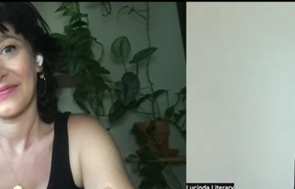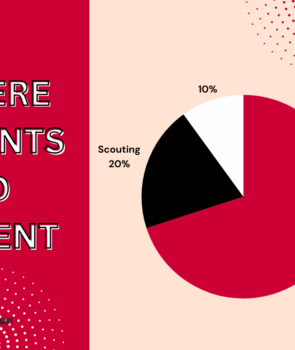A Conversation with Author and Writing Coach Tiffany Hawk
 Lucinda recently sat down for a long conversation with Tiffany Hawk, author of Love Me Anyway, and the voice behind the popular writing blog that shares her name. In this informal interview, Lucinda shares stories of authors she’s scouted, what she’s looking for, and why traditional publishing is (still) king.
Lucinda recently sat down for a long conversation with Tiffany Hawk, author of Love Me Anyway, and the voice behind the popular writing blog that shares her name. In this informal interview, Lucinda shares stories of authors she’s scouted, what she’s looking for, and why traditional publishing is (still) king.
Now that self publishing is a legitimate option for authors, why should they still consider finding a literary agent and traditional publisher, which can be time consuming and difficult?
Surprisingly, we are actually now, more often than not, in the position of convincing authors why they should go the traditional route versus the self publishing route. It is just such an interesting and new position for an agent to be in.
If you do have a thriving online audience or speaking schedule, you might question what a traditional publisher can lend to the equation. We definitely believe in traditional publishing. I think self publishing can certainly work for people who have either a very niche and small audience or, conversely, for those who have a huge audience—a popular online course or podcast— but aren’t really interested in crafting a masterpiece. They’re more interested in having a product or tool to sell their business than in having a book that lives on shelves and gets reviewed in the New York Times or gets featured on NPR.
If you are someone who has a large existing audience, you should always have a conversation with an agent. There are often options for you in the traditional space, which offers the financial benefit of an advance, possibly even a significant one, commensurate with your audience size.
Beyond that, publishers provide decades, if not centuries, of book selling expertise. They bring professional marketing, design, editing, and production elements that you would otherwise have to invest in and hire for on your own. If you self publish, be prepared to do that as a part time, if not full time, job and do it really well.
Also, be prepared, if your book doesn’t sell while self-publishing and you find yourself eyeing an agent or a traditional publisher down the road, they’re going to scrutinize those sales.
Most of all, the biggest reason I recommend that authors with an existing audience try the traditional route first is that publishers offer global distribution.
And distribution is more than just having a distributing partnership, right? I know a lot of places that help people with self publishing will say, “we’re distributed with Ingram,” implying they have the same distribution as a traditional publisher. Can you explain the difference?
Yeah, it’s not the same. Penguin Random House, for instance, has relationships with Amazon, with Books-a-Million, with Barnes and Noble. They have actual relationships with the accounts that are distributing their books in bookstores and online. They’re investing in that and paying for Co-Op. [Co-op, or cooperative advertising, is money publishers give booksellers to promote books, often including things like front-of-the-store placement or publicity in their newsletter.]
That kind of distribution and visibility is a marketing investment on the part of the publisher. When you publish with a self-publisher or a hybrid, you don’t really know what level of distribution and visibility you’re getting.
Even if you’re distributed by Ingram, readers still need to find your book. Usually, a traditional publisher’s big marketing arm helps you get noticed more.
You’re saying, just because a bookstore could order your book through Ingram, it doesn’t mean they’re going to put it on their shelves, promote it on their website, or even know it exists. Getting it on bookstore shelves or front tables is something publishers pay for.
Yes, it’s a combination of organic editorial selection, relationships with booksellers, and co-op.
You talked about the importance of sales numbers with self publishing. If someone has already self published a different book in the past, should they mention it in their query, and does it help or does it hurt?
I am personally of the belief, and other agencies may be different, that you really need to be upfront and honest and not hide important details in your query letter, even in that first conversation. That doesn’t mean you need to be overkill about it, right? Like if you parted in an amicable way with an agent, you don’t need to get into that whole history or bad publishing experience. What you definitely don’t want to do is hide information and have us find out about it. That leaves more work for us to do.
I think the most beneficial way for aspiring authors to approach low sales numbers is to say, “I self published. The sales were modest. But this next book is poised to do differently and here’s how.”
For prescriptive nonfiction, most agents want to see a book proposal, and for fiction, the entire finished manuscript. But memoir seems to be a gray area, with some people wanting one or the other, or both. What do you like to see from a memoirist? And why?
I love this question because I get it so often, but I’ve never been asked this in an interview. There really are two options. If you’re more confident in your marketing and author credentials, then develop the proposal. If you’re more confident in your writing, then develop the manuscript. Essentially, your platform gives you leeway to submit a smaller package, in the form of a 40-60 page proposal, to an agent or publisher (but always check their guidelines first).
Generally, to write a memoir and get it published by a Big Five publisher (or Big Four as it may soon be!), you really need to build up your marketing and author credentials to prove that there’s a wide audience for your life story. If you’re more confident in that, as a memoirist, I would do a book proposal.
With that said, if you elect to write the proposal, and you’re more confident in your actual writing, how beautifully written, how lyrical, and how moving the story is, then I’d actually lean heavier on the sample material than on the marketing material. That doesn’t mean you won’t want to include details about your marketing plan, bio or other things that a publisher is going to weigh. Essentially, you can go in one of two directions really, depending on where your strengths lie.
So if you had a well written memoir that you were more confident about than your platform, you would finish the whole thing and then query?
Yes, but it’s interesting: If I were in the shoes of a memoirist, I’d think heavily about getting the sample material (one to three chapters) beautifully polished, but then turn my attention toward the submission package. I might recommend taking that sample material and combining it with an overview and author bio as a proposal to agents before fleshing out the entire manuscript. Ideally, you’ll want to get an agent involved on the ground floor, if possible.
With memoir, in my position, it’s more often that I’m finding the talent… A perfect example is Michelle Dowd: a cult survivor, who wrote a beautiful piece for Modern Love. I was one of many agents who contacted her about that piece and said, “Educated is the book of the moment. You have this fascinating story and you’re a beautiful writer; have you thought about doing a book?”. Michelle and I then came together and created a proposal from the ground up. That is more often the magical way in which memoir will happen for our agency. Another agent at Lucinda Literary, Connor Eck, has a wonderful story about a memoir he developed called Be Straight With Me.
Very interesting. It’s funny because the way I got my second agent was after a Modern Love column, but I hadn’t considered that you would be finding the majority of your authors that way. That you’re going to them. Fascinating.
Well, it depends. Right now the market is looking at your Instagram platform or your television show—that’s what will move the needle in terms of your getting a book deal for your memoir. So short of that, be present in the right places, like a Modern Love, New York Magazine, the Times. Try getting your idea and your life story out there in a place agents and publishers can find it.
When you mention Instagram, what are some numbers that would actually move the needle or make you look at an author? Because people have such wildly different ideas of what you would be expecting.
This differs agency to agency and publisher to publisher. For our agency, we like to say 10,000 followers on any given social platform as a benchmark, because the first thing an editor or an agent is going to do when they’re seriously considering your query is Google you. They need to know that you are present somewhere and have an audience you’re engaging.
Even if you’re not on Twitter and you hate Instagram, but you’re on Facebook, you want that number to be strong. More than that, you want to demonstrate engagement, showing that people are commenting and interacting with you. If that isn’t going to be apparent, remember that you’re speaking to a very skeptical reader. Agents and publishers are recipients that get slammed with submissions all day long. So if you feel like your platform is going to be a weakness, get out in front of it and say, “My Facebook following is modest, but I have a private Facebook group where I’ve got 2000 highly engaged people.” Or “I have a newsletter list that I speak to regularly that looks forward to having me in their inbox.” However it is you can characterize that engagement is going to be most important to editors.
That’s so helpful. Now, you became a literary agent after working in publicity and marketing at HarperCollins and Scholastic. Can you tell us about the relationship between marketing and book acquisition? Some of this we’ve already touched on, but since you’re known for big-idea or thought-leader books, which should be breaking new ground, I’m especially curious about that challenge – if marketing departments only want to acquire what they’ve already been selling, how do you take chances on books that are bold and original?
Great question. I think there has always been a natural interplay between marketing and content, and that is how I founded my agency. I came from a marketing background. I knew in my heart of hearts that I wanted to develop the careers of authors and that I was more of an editorial person.
Want more publishing insights? Read the rest of the interview here.
Tiffany Hawk is a writing coach, editor, and author who offers moral support and practical advice to writers seeking traditional publication on her blog tiffanyhawk.com.




